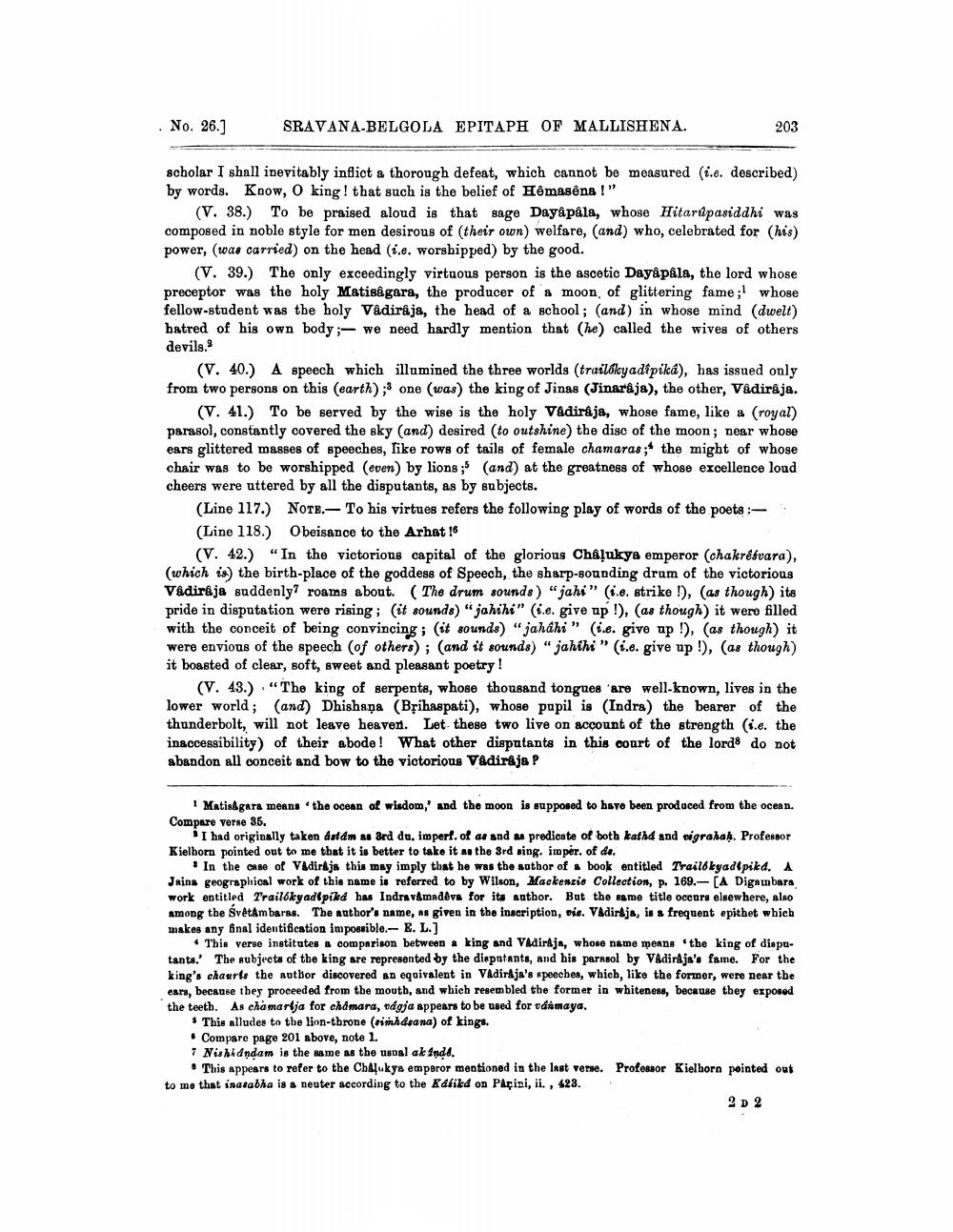________________
. No. 26.)
SRAVANA-BELGOLA EPITAPH OF MALLISHENA.
203
scholar I shall inevitably inflict a thorough defeat, which cannot be measured (i.e. described) by words. Know, O king! that such is the belief of Hêmasêna!"
(V. 38.) To be praised aloud is that sage Dayâpâle, whose Hitarúpasiddhi was composed in noble style for men desirous of their own) welfare, (and) who, celebrated for his) power, (was carried) on the head (i.e. worshipped) by the good.
(V. 39.) The only exceedingly virtuous person is the ascetic Day&påla, the lord whose preceptor was the holy Matisågara, the producer of a moon, of glittering fame;l whose fellow-student was the holy Vadiraja, the head of a school; (and) in whose mind (dwelt) hatred of his own body; we need hardly mention that (he) called the wives of others devils.
(V. 40.) A speech which illumined the three worlds (trailáky adipika), has issued only from two persons on this earth);: one (was) the king of Jinas (Jinarája), the other, Vadiraja.
(V. 41.) To be served by the wise is the holy Vadiraja, whose fame, like a (royal) parasol, constantly covered the sky (and) desired (to outshine) the disc of the moon; near whose ears glittered masses of speeches, like rows of tails of female chamaras;* the might of whose chair was to be worshipped (even) by lions ;5 (and) at the greatness of whose excellence loud cheers were uttered by all the disputants, as by subjects.
(Line 117.) Note. To his virtues refers the following play of words of the poets :(Line 118.) Obeisance to the Arhat 16
(V. 42.) "In the victorious capital of the glorious Châļukya emperor (chakrésvara), (which is the birth-place of the goddess of Speech, the sharp-sounding drum of the victorious Vadiraja suddenly roams about. The drum sounds) "jahi" (i.e. strike !), (as though) its pride in disputation were rising ; (it sounds) "jahihi" (1.e. give up!), (as though) it were filled with the conceit of being convincing ; (it sounds) "jaháhi " i.e. give up !), (as though it were envious of the speech (of others) ; (and it sounds) " jahihi" (i.e. give up !), (as though) it boasted of clear, soft, sweet and pleasant poetry!
(V. 43.), "The king of serpents, whose thousand tongues are well-known, lives in the lower world; (and) Dhishana (Bțihaspati), whose pupil is (Indra) the bearer of the thunderbolt, will not leave heaven. Let these two live on account of the strength (i.e. the inaccessibility of their abode! What other disputants in this court of the lords do not abandon all conceit and bow to the victorious Vadiraja P
1 Matisgara means the ocean of wisdom' and the moon is supposed to have been produced from the ocean. Compare verse 35.
I had originally taken dalam as 3rd do. imperf. of as and a predicate of both kathd and sigrahan. Professor Kielborn pointed out to me that it is better to take it as the 3rd sing. imper. of de.
. In the case of V&dirfjs this may imply that he was the sothor of a book entitled Trailblyadi pikd. A Jains geographical work of this name is referred to by Wilson, Mackenzio Collection, p. 169.- (A Digambara work entitled Trailbky adipikd has Indra våmadêve for its author. But the same title occurs elsewhere, also among the Svêtâm baras. The author's name, as given in the inscription, vis. Vadiraja, is a frequent epithet which makes any final identification impossible.-- E.L.)
This verse institutes a comparison between a king and Vadir&ja, whose name means the king of diaputants. The subjects of the king are represented by the diepntants, and his parasol by Vadiraja's fame. For the king's chaurts the author discovered an equivalent in Vâdirija's speeches, which, like the former, were near the ears, because they proceeded from the mouth, and which resembled the former in whiteness, because they exposed the teeth. As chamarlja for chamara, vágja appears to be used for udamaya.
$ This alludes to the lion-tbrone (windsana) of kinge. . Compare page 201 above, note 1. 7 Nishidndam is the same as the usual ak Indl.
. This appears to refer to the Chalukys emperor mentioned in the last verse. Professor Kielborn pointed out to me that inasabha is a neuter according to the Kafiked on Pacini, ii., 423.
2D 2




